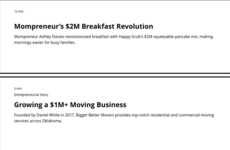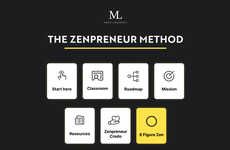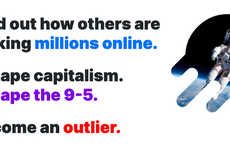
A Place to Find Positive Social Change
Tiana Reid — July 5, 2012 — Social Good
References: twitter
Stephen King is the Founder here at SocialBusiness.org and after interviewing a few of our other contributors, Bianca Bartz and myself, we figured it was time to turn the table and ask King some questions about how and why he started the online publication.
For up-to-date information, you can follow him on Twitter.
Four Questions with Stephen King
1. How did the idea for the business model come about?
The online magazine is the first step in a multi-faceted business. It made sense to start first as it was a way to reach the greatness number of people and proved to be an excellent first step into this new sector. While content-driven models are not massively profitable on their own, they provide branding and awareness that you can leverage for future opportunities. As we believe that social innovation and business revolution will converge in a new way to do business, there will be a number of new businesses, projects, ventures and experiments at that intersection. In the near future both scaling social innovation and consulting with big businesses are immediate opportunities. Beyond these both policy work and education are critical factors for the sector to accelerate.
2. How did you decide to join this sector?
It is hard to put a finger on, as the move into this sector has been a growing itch for decades. I have always known that business could be used more for a power for good, it just took me sometime to find the right answer. The tipping point in some ways came after we found out we were having a child, and I think it really hit me that there was just more I could be doing, for the sake of him and ourselves to make the world a better place. The trade-offs and compromises became excuses, and I could feel that it was time. A bit risky to quit your job, have a child and we had also just bought a house, although it also felt like a great time. This was going to be the next chapter in so many ways. Let’s really turn the page.
3. How do you get your inspiration?
Being a borderline introvert and extrovert, the inspiration tends to come from an even mixture of interaction and introspection. The introspection is found in running, books and the accidental run-in with random information (like street corners, posters, what strangers are doing/saying). Interacting with people is a very different trip, this is where you can be driven to push your thinking and ideas, that rush keeps you on a high for days.
4. How do you reset yourself to be creative? Do you have any rituals?
This is something I have never found that I need to switch on or off, although the setting does need to be right for it to happen. Creativity for me is closely aligned to trust and safety, a sense that you can be free in the way you think and act. If those conditions are set, then it just flows, almost unstoppable. The fusion that can be created with connections and possibilities is really endless. I find that most of the flow comes from thinking about society, what they want, what are they doing, what would work for them and then what the gaps are -- in this lies an endless supply of possibility.
For up-to-date information, you can follow him on Twitter.
Four Questions with Stephen King
1. How did the idea for the business model come about?
The online magazine is the first step in a multi-faceted business. It made sense to start first as it was a way to reach the greatness number of people and proved to be an excellent first step into this new sector. While content-driven models are not massively profitable on their own, they provide branding and awareness that you can leverage for future opportunities. As we believe that social innovation and business revolution will converge in a new way to do business, there will be a number of new businesses, projects, ventures and experiments at that intersection. In the near future both scaling social innovation and consulting with big businesses are immediate opportunities. Beyond these both policy work and education are critical factors for the sector to accelerate.
2. How did you decide to join this sector?
It is hard to put a finger on, as the move into this sector has been a growing itch for decades. I have always known that business could be used more for a power for good, it just took me sometime to find the right answer. The tipping point in some ways came after we found out we were having a child, and I think it really hit me that there was just more I could be doing, for the sake of him and ourselves to make the world a better place. The trade-offs and compromises became excuses, and I could feel that it was time. A bit risky to quit your job, have a child and we had also just bought a house, although it also felt like a great time. This was going to be the next chapter in so many ways. Let’s really turn the page.
3. How do you get your inspiration?
Being a borderline introvert and extrovert, the inspiration tends to come from an even mixture of interaction and introspection. The introspection is found in running, books and the accidental run-in with random information (like street corners, posters, what strangers are doing/saying). Interacting with people is a very different trip, this is where you can be driven to push your thinking and ideas, that rush keeps you on a high for days.
4. How do you reset yourself to be creative? Do you have any rituals?
This is something I have never found that I need to switch on or off, although the setting does need to be right for it to happen. Creativity for me is closely aligned to trust and safety, a sense that you can be free in the way you think and act. If those conditions are set, then it just flows, almost unstoppable. The fusion that can be created with connections and possibilities is really endless. I find that most of the flow comes from thinking about society, what they want, what are they doing, what would work for them and then what the gaps are -- in this lies an endless supply of possibility.
Trend Themes
1. Social Innovation and Business Revolution - The convergence of these two fields presents opportunities for new businesses and ventures, as well as consulting with big businesses.
2. Scaling Social Innovation - There is potential for growth in further developing and expanding social innovation within different industries.
3. Education for Social Innovation - Education and policy work are critical factors for accelerating progress in the social innovation industry.
Industry Implications
1. Social Innovation - This refers to companies and organizations that focus on creating positive social change through innovative solutions.
2. Consulting - There is an opportunity for consulting firms to work with businesses that are interested in incorporating social innovation into their practices.
3. Education - Schools and universities can provide education for students interested in pursuing a career in social innovation and entrepreneurship.
4.3
Score
Popularity
Activity
Freshness























